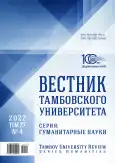Coaching instruments in teaching general English
- Authors: Ilina O.K.1
-
Affiliations:
- Moscow State Institute of International Relations (University) of the Ministry of Foreign Affairs of the Russian Federation
- Issue: Vol 27, No 4 (2022)
- Pages: 978-987
- Section: THEORY AND METHODS OF FOREIGN LANGUAGE TEACHING
- URL: https://journal-vniispk.ru/1810-0201/article/view/298272
- DOI: https://doi.org/10.20310/1810-0201-2022-27-4-978-987
- ID: 298272
Cite item
Full Text
Abstract
The most important feature of education in the information society, according to the laws of which humanity lives today, is lifelong learning, and therefore the ability to learn becomes one of the key competencies. Today, the ability to acquire knowledge on one’s own, without the help of a teacher, is of particular importance, which creates the need to form students’ cognitive interest and self-education skills. This is facilitated by the coaching approach to learning, which is a new step in the methodology of teaching foreign languages, and involves a partnership between the teacher and the student in the educational process, the student’s awareness of the personal need for mastering knowledge and the need to take responsibility for the result. The purpose of the research is to describe the tools of the coaching approach to teaching general English. The research showed that the creation of a relationship of trust and partnership in the educational process is facilitated by: meeting the student’s need for meaningful learning, understanding and recognition of the student’s values, active listening, developing feedback, and effective questions. The use of these technologies is intended to provide students with access to self-education in the future. The study concludes that the use of coaching approach tools in teaching general English contributes to the maximum disclosure of learners’ internal resources and capabilities.
About the authors
O. K. Ilina
Moscow State Institute of International Relations (University) of the Ministry of Foreign Affairs of the Russian Federation
Author for correspondence.
Email: Ol-1-Sh@yandex.ru
ORCID iD: 0000-0003-2372-2068
Candidate of Philology, Associate Professor, Associate Professor of English Language Department no. 3
119454, Российская Федерация, г. Москва, просп. Вернадского, 76References
- Savina A.K. Informatsionnoye obshchestvo i problemy obrazovaniya v mire kak istoricheskaya real’nost’ [In-formation society and educational problems in the world as a historical reality]. Istoriko-pedagogicheskiy zhur-nal [Historical and Pedagogical Journal], 2015, no. 2, pp. 167-180. (In Russian).
- Repetyuk V.F. Masuda Y. Informatsionnoye obshchestvo kak postindustrial’noye obshchestvo [Information society as a post-industrial society]. Sotsiokul’turnyye utopii XX veka [Sociocultural Utopias of the 20th Century]. Moscow, Institute for Scientific Information on Social Sciences Publ., 1983, issue 2, pp. 190-209. (In Russian).
- Tsekhanovich A.M. Sovremennyye podkhody v obuchenii angliyskomu yazyku [Modern approaches in teaching English]. Metodicheskiy sbornik № 31 [Methodical Collection no. 31]. Moscow, Samson Publ., 2017, pp. 53-66. (In Russian).
- Dauni M. Effektivnyy kouching. Uroki trenera kouchey [Effective Coaching. Lessons from the Coach’s Coach]. Moscow, Dobraya Kniga Publ., 2008, 277 p. (In Russian).
- Gallway T.W. Rabota kak vnutrennyaya igra. Fokus, obucheniye, udovol’stviye i mobil’nost’ na rabochem meste [The Inner Game of Work: Focus, Learning, Pleasure, and Mobility in the Workplace]. Moscow, Alpina Publ., 2012, 266 p. (In Russian).
- Serbinovskaya N.V., Serbinovskiy B.Y. Psikhologicheskiye instrumenty i organizatsionnyye problemy kouchin-ga v realizatsii strategii «Obrazovaniye v techeniye vsey zhizni» [Psychological instruments and organization problems of coaching in realizing strategies “Life long learning”]. Nauchnyy zhurnal KubGAU – Polythematic Online Scientific Journal of Kuban State Agrarian University, 2012, no. 77, pp. 1-21. (In Russian).
- Lytkina O.I., Ponomareva A.Y. Printsipy yazykovogo kouchinga v prepodavanii inostrannykh yazykov [Prin-ciples of language coaching in teaching foreign languages]. Vestnik SVFU. Seriya: Pedagogika, filosofiya, psik-holo-giya – Vestnik of North-Eastern Federal University. Pedagogy. Psychology. Philosophy, 2019, no. 4 (16), pp. 40-44. (In Russian).
- Edwards L., Roberts R. High Note 5. London, Pearson PLC Publ., 2020, 189 p.
- Uitmor J. Kouching vysokoy effektivnosti. Novyy stil’ menedzhmenta, Razvitiye lyudey, Vysokaya effektivnost’ – Coaching for Performance GROWing People, Performance and Purpose. Moscow, International Academy of Corporate Management and Business Publ., 2005, 168 p. (In Russian).
- Barber D., Foord D. From English Teacher to Learner Coach. London, The Round Publ., 2014, 209 p.
- Gallway T.W. The Inner Game of Tennis: The Classic Guide to the Mental Side of Peak Performance. London, Pan Macmillan Publ., 2014, 170 p.
- Brolpito A. Tsifrovyye navyki i kompetentsiya, tsifrovoye i onlayn-obucheniye [Digital Skills and Competence, Digital and Online Learning]. Turin, European Training Foundation Publ., 2019, 84 p. (In Russian).
- Betham E. An Introduction to Coaching for Language Learning. North Charleston, 2018, 205 p.
- Eremina N.V., Kabanova O.V., Terekhova G.V. Opyt lingvokommunikativnoy podgotovki studentov neyazykovykh spetsial’nostey [Non linguistic specialties students linguistic and communicative training experience]. Vestnik Orenburgskogo gosudarstvennogo universiteta – Vestnik of the Orenburg State University, 2015, no. 2, pp. 47-53. (In Russian).
Supplementary files








